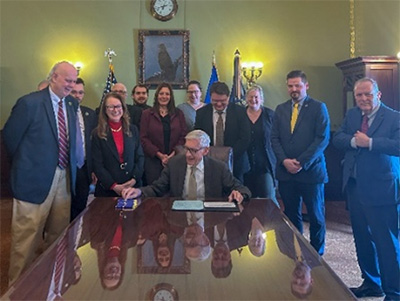Outdated or Unsupported Browser Detected
DWD's website uses the latest technology. This makes our site faster and easier to use across all devices. Unfortunatley, your browser is out of date and is not supported. An update is not required, but it is strongly recommended to improve your browsing experience. To update Internet Explorer to Microsoft Edge visit their website.

Tony Evers, Governor
Amy Pechacek, Secretary
Department of Workforce Development
Secretary's Office
201 E. Washington Avenue
P.O. Box 7946
Madison, WI 53707-7946
Telephone: (608) 266-3131
Fax: (608) 266-1784
Email: sec@dwd.wisconsin.gov
FOR IMMEDIATE RELEASE
March 25, 2024
CONTACT: DWD Communications
CommunicationsOffice@dwd.wisconsin.gov
Decades-old advisory council process supports Wisconsin Worker's Compensation Act
MADISON – Gov. Tony Evers Friday signed Assembly Bill 1073, now 2023 Wisconsin Act 213. The act makes several improvements to Wisconsin's worker's compensation system as recommended by the Worker's Compensation Advisory Council (WCAC).

"For decades, this council has advised state government on how to best support and strengthen the state's worker's compensation system, and we thank the council for its contributions," Department of Workforce Development (DWD) Secretary Amy Pechacek said. "The collaborative agreed-upon bill process keeps our worker's compensation system a national model of stability and effectiveness. In addition to recognizing the council, we thank Gov. Evers for signing this bill into law."
The bill received the unanimous approval of labor and management members of the council before being sent to the legislature for passage and then to Gov. Evers for his review.
"I would like to recognize members of the advisory council from both management and labor for the hard work and dedication it took to formulate and present this proposal," said Stephanie Bloomingdale, WCAC caucus co-chair and president of the Wisconsin State AFL-CIO. "Together, we advanced legislation to protect injured workers and safeguard Wisconsin’s respected Worker’s Compensation Act."
"This legislation reflects good-faith negotiations between representatives of employers and employees in which both sides made substantial compromises," said Rachel Ver Velde, WCAC caucus co-chair and associate vice president of government relations at Wisconsin Manufacturers & Commerce. "The final product makes well-conceived and incremental changes to the system which has been the hallmark of Wisconsin's approach to policymaking in the worker's compensation system."
2023 Wisconsin Act 213 includes language to:
A citizen advisory council has existed since 1911 to assist DWD and the Wisconsin Legislature in amending the Wisconsin Worker's Compensation Act. The Wisconsin Worker's Compensation Advisory Council was created by Chapter 327 Laws of 1967 (effective Feb. 18, 1968) to advise the Department and Legislature on policy matters concerning the development and administration of the worker's compensation law. The council strives to maintain the overall stability of the workers compensation system without regard to partisan changes in the legislative or executive branches of government.
One of the main functions of the council is to recommend worker's compensation law changes to the Legislature through the "agreed bill" process. The process begins with the council holding public hearings throughout the state where testimony is taken from all interested sources. Council members agree to support the council's proposed changes in the Legislature and not to individually seek any changes to those proposals. Likewise, the council members traditionally agree not to support any worker's compensation law changes which have not gone through the "agreed bill" process. By tradition the council only recommends statutory changes that pass without dissent. When the Legislature approves the council's recommendations and forwards the bill to the governor, the bill traditionally is signed into law.
The statutes prescribe the council's membership as follows:
Wisconsin's Department of Workforce Development efficiently delivers effective and inclusive services to meet Wisconsin's diverse workforce needs now and for the future. The department advocates for and invests in the protection and economic advancement of all Wisconsin workers, employers, and job seekers through six divisions – Employment and Training, Vocational Rehabilitation, Unemployment Insurance, Equal Rights, Worker's Compensation, and Administrative Services. To keep up with DWD announcements and information, sign up for news releases and follow us on LinkedIn, Facebook, Instagram, X, and YouTube.